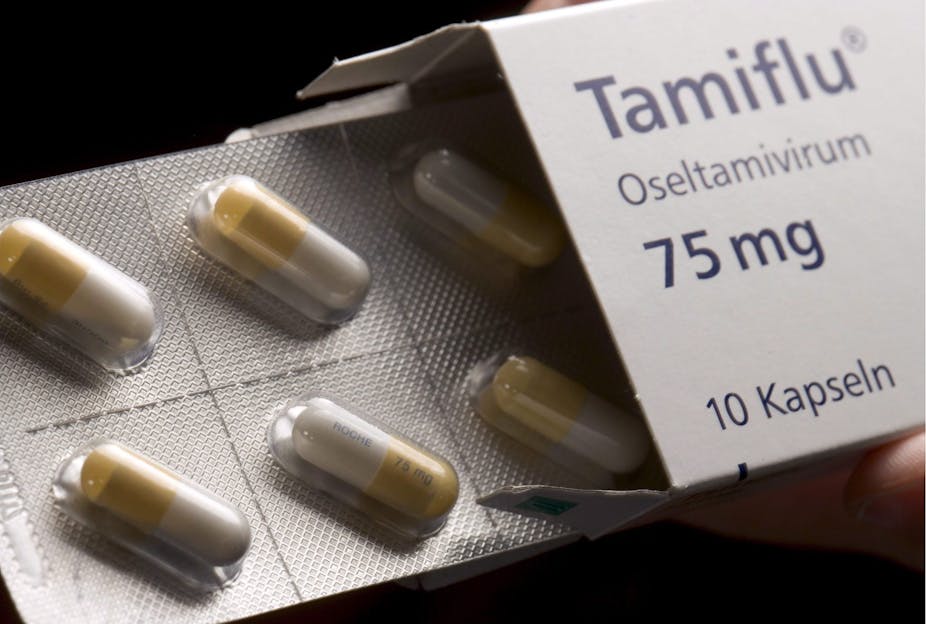Public health researchers have stepped up their campaign to access clinical trial data about influenza drug Tamiflu, amid concerns about its effectiveness.
Professor Peter Gøtzsche, leader of the Nordic Cochrane Centre in Copenhagen, has called for drug company Roche, which manufacturers Tamiflu, to be sued over its refusal to share data with independent researchers.
Meanwhile, questions are being raised about whether Tamiflu works in the way its manufacturers claim, or acts like paracetamol instead.
Tamiflu, or oseltamivir, is supposed to reduce complications from flu, such as pneumonia, and reduce the rate of hospitalisation and death during outbreaks of the illness.
The drug was stockpiled in Australia, Europe and the US following the swine flu outbreak of 2009. The British Medical Journal claims it has made billions of pounds for Roche.
The journal has launched a website showing correspondence between the team of researchers and Roche over the request for more data.
The Cochrane Group conducts periodic independent reviews of drug effectiveness, and first requested data from Roche in 2009 after a Japanese paediatrician criticised their use of secondary data.
Cochrane Group member Peter Doshi, a Post Doctoral Fellow at Johns Hopkins University, said the criticism is fair, and that only clinical review trials from the manufacturer can tell the story of Tamiflu’s effectiveness.
“We’ve been trying to make the argument for quite a while that one needs access to detailed records, and there simply is not enough detail in a journal article in order to do a credible assessment,” he said.
“When drug regulators want to know what happens in a drug trial they can turn to a clinical study report that might run to thousands of pages in length. For everyone else, we’re just left with a ten page synopsis that we call a journal article.”
Bond University researcher Professor Chris del Mar, who also worked on the Cochrane review, said Roche initially promised to make the full data available to researchers, but has failed to provide it.
“They said they’d give the data to us after we made a big splash in the British Medical Journal, but they only made part of the trials available to us, and it’s not enough for us to be sure about the data,” he said.
The researchers were able to access some additional data through the European Medicines Agency, but still lack three of the five “modules” that form the entire clinical study. These modules are believed to contain patient level data about the drug.
In a statement to the British Medical Journal, a representative for Roche said the company could not make any more data available due to confidentiality concerns.
“Roche complies with all legal requirements regarding the publication of data and does not generally make patient level data available due to legal and confidentiality constraints,” the statement read.
Doshi said he was unconvinced by these claims.
“I don’t buy it,” he said. “What’s confidential?”
“There are certain things about the manufacture of a drug that I would agree are confidential, but we’re not interested in the manufacturing process, we’re interested in the clinical data and we’re interested in the de-identified form of it.”
Meanwhile, questions remain as to how Tamiflu actually works, and how effective it will be in the case of a pandemic.
“Governments stockpiled Tamiflu with assumptions about its benefit that made public health sense; namely that it would reduce complications, reduce hospitalisations and reduce death,” Doshi said.
“We looked at more than 16,000 pages of clinical study reports and we found no evidence for most of those assumptions.”
“That’s extremely concerning if you think about how much money was spent on this drug.”
In Professor del Mar’s view, widespread use of Tamiflu could actually exacerbate a pandemic situation rather than alleviating it.
“One of hypotheses we’d like to test, if only we had the data, is that Tamiflu works like paracetamol; in other words it reduces the fever centrally in the body to make you feel better,” he said.
“It could be that Tamiflu would act in the wrong direction in a pandemic, because it would make people feel better, so they’d get out of their sick beds and go wandering around trying to go about their normal business, but they would still be secreting virus. It would actually spread the influenza more in the community.”“
He said doctors should think twice before prescribing the drug.
"I don’t think it’s worth using,” he said.
“I’m not a great user of Tamiflu and I would probably recommend my patients use paracetamol instead.”


